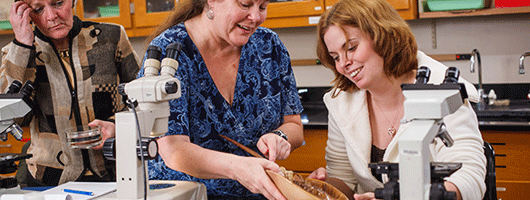 Bachelor of Science (B.S.) in Biological Sciences
Bachelor of Science (B.S.) in Biological Sciences
4-Year Degree Plan (Sample)
About the Bachelor of Science in Biological Sciences
The Bachelor of Science (B.S.) degree is appropriate for students oriented toward graduate school, professional school (medical, dental, pharmacy, optometry, veterinary), or positions that require greater depth in the biological and physical sciences. This degree provides a strong background in the fundamentals of biology and cognate areas and prepares the student for a career as a professional biologist.
Academic Advising
Students planning to major in biology should contact an academic advisor in biological sciences before their first semester to develop a plan for their academic course of study. College policy on advising requires that students meet with their academic advisors at least once each year; biology majors meet with their advisors prior to each semester’s enrollment. Advising holds are reset following advising appointments. To determine the name and contact information for your advisor, see Onestart.
Degree Requirements (120 cr.)
Students receiving the Bachelor of Sciences degree in Biological Sciences must complete 120 total credit hours including |
- Campuswide General-Education Curriculum (33-39 cr.).
Note | Math courses for the B.S. in Biological Sciences fulfill the Quantitative Reasoning requirement.
Note | BIOL-L 403 Biology Seminar fulfills the Visual Literacy requirement and is required for all biology majors - World Language Studies requirement (3-9 cr) | At least one course at the 200-level or higher; or formal training, as evidenced by secondary or university diplomas, in a language other than English. For more details, see World Language Studies.
- A minimum of 30 credit hours at the 300- or 400-level.
Biology courses must be completed with a grade of C or higher.
All courses are 3 credit hours, unless otherwise designated.
Core Biology and Cognate Science Requirements (62 cr.)
Biological Sciences
- BIOL-L 101 Introduction to Biological Sciences 1 (5 cr.)
- BIOL-L 102 Introduction to Biological Sciences 2 (5 cr.)
- BIOL-L 211 Molecular Biology
- BIOL-L 311 Genetics
- BIOL-L 403 Biology Seminar
Chemistry
- CHEM-C 105 Principles of Chemistry I
- CHEM-C 106 Principles of Chemistry II
- CHEM-C 125 Experimental Chemistry I (2 cr.)
- CHEM-C 126 Experimental Chemistry II (2 cr.)
- CHEM-C 341 Organic Chemistry Lectures 1
- CHEM-C 342 Organic Chemistry Lectures 2
- CHEM-C 343 Organic Chemistry Laboratory 1 (2 cr.)
- CHEM-C 344 Organic Chemistry Laboratory 2 (2 cr.)
Physics
Select one of the following sequences:
Sequence 1
- PHYS-P 201 General Physics 1 (5 cr.)
- PHYS-P 202 General Physics 2 (5 cr.)
Sequence 2
- PHYS-P 221 Physics 1 (5 cr.)
- PHYS-P 222 Physics 2 (5 cr.)
Mathematics
- MATH-M 215 Calculus I (5 cr.)
- MATH-M 216 Calculus II (5 cr.)
Statistics
- One course in statistics (BIOL-L 220 Biostatistics recommended)
Elective Courses in Biology (22 cr.)
- Students must complete at least 22 additional credit hours of elective biological sciences courses. This coursework must include at least three laboratory classes, at least one course from the organismal courses area, and at least one course from the cellular courses area.
Organismal Courses
- BIOL-B 300 Vascular Plants
- BIOL-L 304 Marine Biology
- BIOL-L 308 Organismal Physiology (5 cr.)
- BIOL-L 318 Evolution
- BIOL-L 342 Tropical Marine Biology Field Course
- BIOL-L 473 Ecology
- BIOL-L 474 Field and Laboratory Ecology (2 cr.)
- BIOL-L 490 Individual Study (1-12 cr.)
- BIOL-Z 373 Entomology
- BIOL-Z 383 Laboratory in Entomology (2 cr.)
- BIOL-Z 460 Animal Behavior
- BIOL-L 490 Individual Study
- PHSL-P262 Human Anatomy and Physiology 2 (5 cr.)
Cellular Courses
- BIOL-L 280 Introduction to Bioinformatics
- BIOL-L 312 Cell Biology
- BIOL-L 313 Cell Biology Laboratory
- BIOL-L 317 Developmental Biology
- BIOL-L 321 Principles of Immunology
- BIOL-L 323 Molecular Biology Laboratory
- BIOL-L 490 Individual Study (1-12 cr.)
- BIOL-M 430 Virology Lecture
- MICR-M 310 Microbiology
- MICR-M 315 Microbiology Laboratory (2 cr.)
Minor in Biological Sciences
Requirements (21 cr.)
All courses are 3 credit hours, unless otherwise designated.
- BIOL-L 101 Introduction to Biological Sciences 1 (5 cr.)
- BIOL-L 102 Introduction to Biological Sciences 2 (5 cr.)
- BIOL-L 211 Molecular Biology
- Additional majors courses, including at least one course at the 300- or 400-level, and at least one laboratory course (8 cr.)